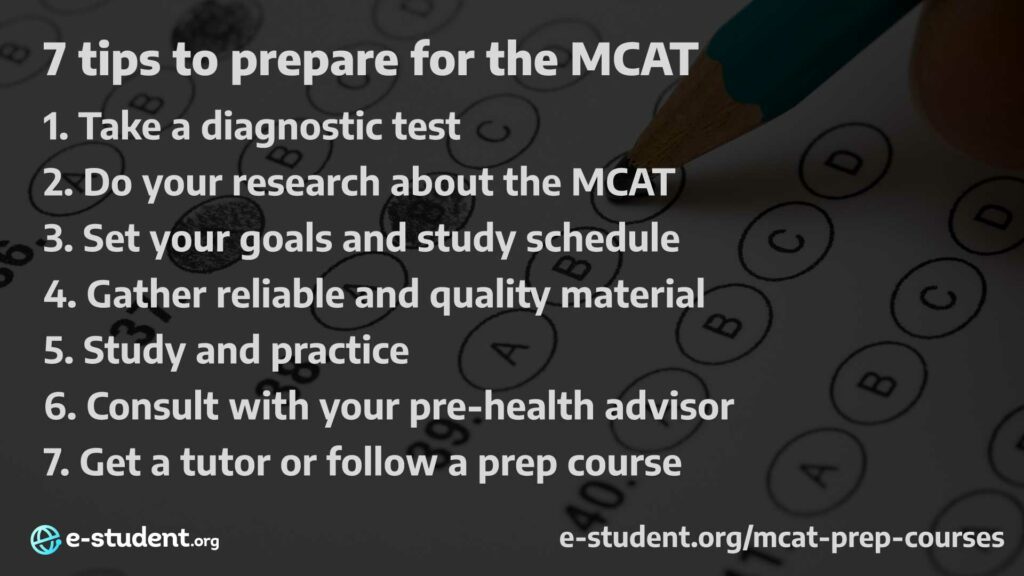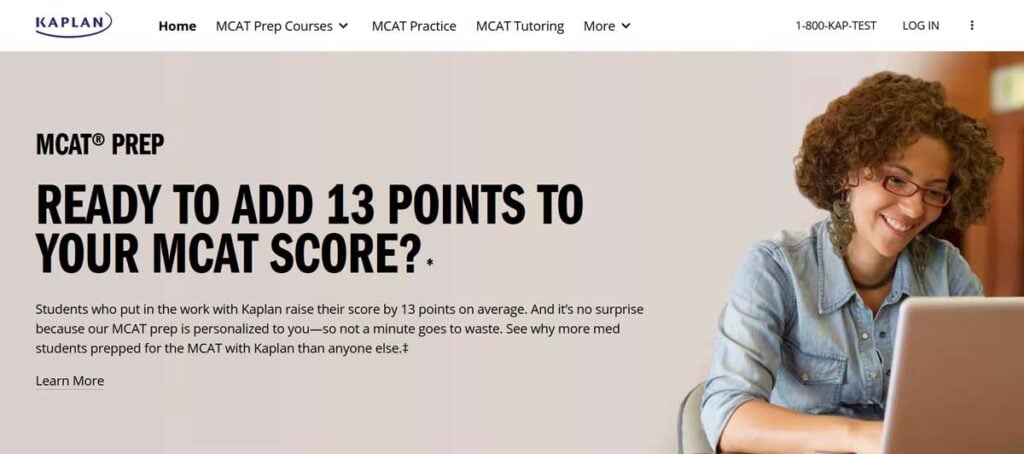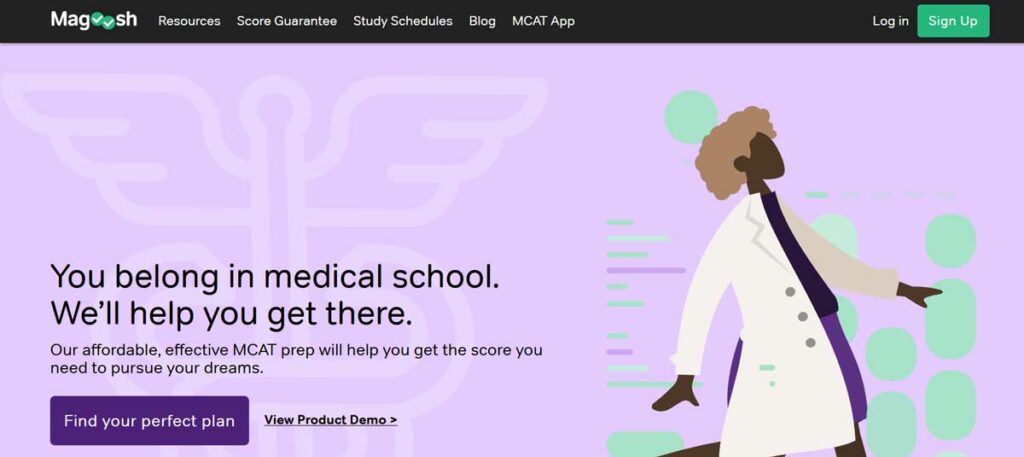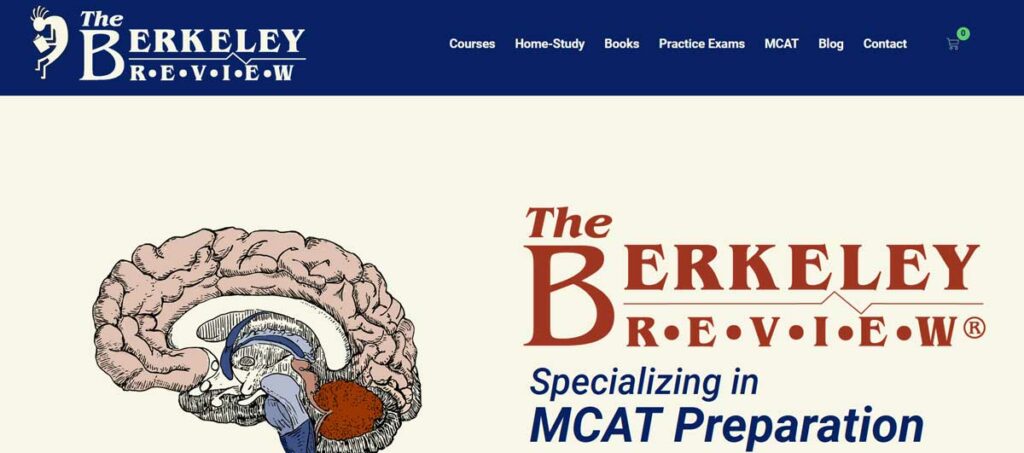Becoming a healthcare professional is a lifelong dream for many, and the first step to pursuing it is to apply to medical schools. US medical schools have a reputation for being extremely selective, so it’s not surprising that they use a wide range of criteria to handpick the most exceptional among about 50,000 candidates each year. To be a competitive applicant (and hopefully get accepted to your dream school), every aspect of your application must stand out, from your GPA, personal statement, and letter of recommendation, to your MCAT score. The latter is a particularly challenging component, so in this article, we’ll be looking at our recommendations for the best online courses that will help you prepare for the MCAT.
Table of Contents
What is the MCAT?
The Medical College Admission Test (MCAT) is a computer-based multiple-choice exam administered by the Association of American Medical Colleges (AAMC). The standardized test is designed to evaluate prospective medical students on their problem-solving, critical thinking, verbal analysis, and scientific knowledge.
The MCAT is 7.5 hours long and consists of 4 sections:
- Biological and Biochemical Foundations of Living Systems;
- Chemical and Physical Foundations of Biological Systems;
- Psychological, Social, and Biological Foundations of Behavior; and
- Critical Analysis and Reasoning Skills.
Each is scored from 118 to 132, making the total MCAT score ranging from 472 to 528. For the year 2022, the average is 501.5, and a score of 518 will land you in the 95th percentile.
To be eligible to take the MCAT, US students must verify that they are planning to apply to a health professions school or a health-related program, while international examinees should hold/are in a Bachelor of Medicine and Bachelor of Surgery (MBBS) degree program. If you aren’t planning to apply to a health professions school or if you’re currently an enrolled medical student (apart from the MBBS), you must obtain “special permission” from the AAMC to take the exam.
How do I best prepare for the MCAT?
As if its length, breadth, and depth are not demanding enough, you are only allowed a limited set of times to take the MCAT. However, don’t let that put you off yet. Here are some tips on how to make the process much more enjoyable and maximize your test score.

- Take a diagnostic test: this step helps you achieve not just one but several things. One, you get exposed to the length, format, and content of the test. Two, you learn the areas that you need some more work on, that are of your expertise, or that you have completely no idea about. And three, you can self-evaluate how ready you are, physically, mentally, and academically, for the MCAT.
- Do your research: understand all the basic information of the MCAT: the scope, the scoring, the testing process, etc. You will also want to look at your intended schools’ data on MCAT scores. Take into consideration figures like the minimum score accepted, the score range, and the average.
- Set your goals and study schedule: after accumulating the necessary information, build a personalized study plan based on your initial and target score, planned test date, time available, and learning style. Spending 300 to 350 hours over several months prepping is generally suggested by experts, and you will want to start early to fully master all the important principles.
- Gather reliable and quality material: make sure that your practice tests, physical books, or any study material are as accurate and realistic as possible. The official AAMC material is highly recommended, or you can also consider some trusted and creditable providers like Kaplan or the Princeton Review, to name a few.
- Study and practice: from the result of your pre-assessment, focus on the concepts that need more work but don’t forget to review those you are already good at. Read up on the best study methods. Do full-length practice tests and try to mimic the actual testing environment, which helps familiarize yourself with the exam setting and minimize test anxiety, fatigue, and uneasiness in general.
- Consult with your pre-health advisor: having any problems or discouragement during your journey? A quick session with your advisor might help you more than you think. Their experience, understanding, and compassion will guide you through the intimidating process. You can also ask them for study tips and what to expect in your testing room.
- Get a tutor or follow a prep course: Widely considered the most challenging exam you could ever take, the MCAT requires intensive and extensive preparation. I strongly encourage you to look for prep courses and tutoring options unless you want to try to prove something by doing it all on your own without guidance.
Following is a list of 9 MCAT prep providers that I truly consider to be the best of the best. Some standards you should keep in mind are the course material, price, free trial, course features, and testimonials. While an online course for the MCAT can have a fairly high price tag, keep in mind that it is most likely an investment in getting started in a well-paid career. Have a look at them to find out which one works best for you, and start prepping today!
Best Overall: Kaplan MCAT® Prep

- Impressive study resources and features
- Includes physical books
- Live classes available
- Official AAMC material
- 30-day free trial
- Unlimited office hours in premium plans
- Score guarantee for premium plans
Cons
- On the expensive end
- The wealth of options can be confusing
- Score guarantee only available for higher-priced courses
One of the leading forces in standardized test prep in general and MCAT prep in particular, Kaplan has proven to be the first choice for many prospective medical students. Overall, Kaplan manages to deliver – the company is rated 4.6/5 on Trustpilot by approximately 4,900 students and parents and claims an average of 13 points increase among its students.
Kaplan offers five different MCAT courses, ranging from $1,699 to $10,999, including:
- On-Demand Course (pre-recorded)
- Live Online Course
- In-Person Course (as long as you have an MCAT prep expert near you)
- Private Tutoring + Live Online Course
- Bootcamp (5-6 weeks in-person or online)
If you prefer to study on your own, why not purchase study materials from its three bundle packages, priced at $329-$549? Their Gold, Platinum, and Ultimate packages will give you access to practice tests, their question bank, including explanations, as well as physical review books for the higher-priced packages.
In case you are only interested practice tests or the question bank, these can also be purchased separately. And if you would just like the books, you can save some money by buying these separately.
Depending on the option you choose, you will gain access to immense learning resources: 3,000 questions, all official AAMC material, 8+ full-length practice tests, 90+ content videos, 7 physical books, etc. In premium courses, additional features like unlimited office hours, personalized homework assignments, and study plans are also available. If you are a tech enthusiast, Kaplan will also surely impress you with its virtual reality study app with more than 1,000 science topics.
Undecided students can make use of its 30-day free trial and complimentary resources like prep week, trial class, and live events before determining whether to enroll or not.
However, there are drawbacks to its offerings. Some would argue that its courses are overpriced (however, if you’re lucky with your timing, they sometimes offer substantial discounts in the $500-$1,000 range). The different sets of content, pricing, and features for different courses prove to be confusing and overwhelming. Furthermore, I find it disappointing that the company only offers score guarantees for the higher-priced courses.
But all in all, I consider Kaplan to be the best MCAT prep provider, and if you want to give yourself the best chance of getting the MCAT score you need, this will be your best option.
Best Study Materials: The Princeton Review MCAT® Prep

- In-person option available
- Official AAMC material
- Includes physical books
- 7-day free trial
- High average score
- Impressive course material
- Offers admission counseling program
Cons
- On the expensive end
- The wealth of options can be confusing
- Score guarantee only available for higher-priced courses
The Princeton Review is an established test prep company with more than 40 years in the industry. The company claims that its students’ average MCAT score is 514 – that’s 2 points higher than the average score accepted to medical schools – and that it has the highest results among similar businesses.
The company markets eight plans for MCAT, with costs running from $183/hour for private tutoring to $6,449 for their highest-priced package. The options include:
- LiveOnline – live online prep classes
- MCAT 513+ – score-guaranteed course available online and in-person
- 515+ Immersion – intense prep course designed to give you an even higher score
- Self-Paced – practice materials and pre-recorded sessions
- Private Tutoring – both online and in-person
- MCAT Topic Focus – guided group practice on specific topics
- CARS Skill Builder – live online courses
- Comprehensive Admission Counseling Program – more holistic guidance to your medical school applications
I would say that The Princeton Review never misses in terms of its study materials: 16 full-length online practice tests (including all released AAMC material), 500+ on-demand videos, 11 MCAT books, detailed explanations for each question, etc. (although the depth and width may vary for each course). There is also a flashcard app for you to quickly go through concepts and principles, and some options can be held in person to your preference. On the whole, The Princeton Review offers the most comprehensive materials and courses that can cater to all kinds of clients.
Kaplan and The Princeton Review are very similar in both what they offer (and that both offer high-quality prep material) and their shortcomings: high cost, confusing sets of services, and score guarantees only on select courses. The reasons why we in general recommend Kaplan over Princeton Review are the former’s better textbooks, more generous 30-day trial, and somewhat lower prices, especially when discounts are offered.
If you’re not sure about this provider, don’t hesitate to go for their 7-day trial or free offerings like practice tests, pre-assessment, strategy sessions, and webinars to see if Princeton Review is the right choice for you.
Best Value: Magoosh MCAT®

- Score guarantee
- 7-day refund and free trial
- Possible to pause your account
- Email support from experts
- Free prep/financial aid option available
Cons
- Online courses only
- No tutoring
- Less material compared to premium providers
Magoosh is a team of educators committed to providing effective, stress-free, and accessible studying. For MCAT prep, the company has attracted more than 7,000 students and helped them get into medical schools like NYU Langone Health, LECOM, and Duke University School of Medicine.
What sets them apart from the likes of Princeton Review and Kaplan is offering high-quality material at a considerably lower price point, including a +10 score guarantee. For $399 for 12 months of access (or $379 for one month, but I can’t see anyone choosing this option), you will get 380+ content review videos, 740+ questions (including up to 3 full-length practice tests), detailed explanations for every question, and customizable study plans. Magoosh also has both a mobile-accessible platform and a mobile flashcard app for MCAT, which helps you study while on the run.
You can also pause your account any time you want (particularly useful if you are having a particularly busy time in your studies), and if unsatisfied with the services you receive, you can cancel within the first seven days.
Keeping its courses affordable means that Magoosh does not provide some premium features like tutoring and has less to offer regarding its study content. A team of MCAT tutors is available 24/7 to answer any questions you may have while studying, but the plans do not include tutoring or live classes. However, if you are a student on a tight budget or if your schedule anyway does not allow for adding live classes, Magoosh is the ideal choice.
Best for Tutoring: Varsity Tutors MCAT®

- Outstanding expert tutors – both online and in-person
- Customized tutoring programs
- Score and tutor satisfaction guarantees
- Extensive free practice tests
Cons
- Weak score guarantee
- Lack of information on the website
Since 2007, Varsity Tutors has been a national front-runner in private and group tutoring. Its vision is to connect expert tutors and students through a pioneering virtual learning platform, in any subject, anywhere, anytime.
The company’s specialty is subject-based study sessions led by very accomplished tutors. Many of them are grad students or have obtained Master’s degrees from prestigious institutions. If you are a busy student who values flexibility, rest assured that Varsity Tutors can pair you with a compatible tutor, whether you would like to meet them in person or online. The company also gives you 860 subject-based practice questions, flashcards, and diagnostic tests for MCAT test takers to refine their skills.
Varsity Tutors offer two guarantees: satisfaction with the tutor, and a score improvement guarantee. While the general tutor satisfaction guarantee is welcome, the score improvement guarantee is quite weak (it only guarantees that you will increase your score, not by how much).
Its most concerning drawback is the lack of information. You can hardly find anything regarding the hourly rate, the study sessions, etc., on its website. You are required to fill out an information form or contact its consultants directly to get further information. This is, however, understandable as different tutors have different rates, and the idea is that they will help design a personalized program you. If you need more help with a specific area of the MCAT, I would recommend that you consider Varsity Tutors for personalized feedback and a custom tutoring plan.
Good Alternative: Blueprint Prep MCAT®

- Flashcards
- Official AAMC material
- Free practice account
- Physical books
- Unlimited duration of prep material access
- Office hours
Cons
- On the expensive end
- No score guarantee
After 17 years in business, Blueprint Prep has proven to be one of the leading companies in higher education preparation, especially MCAT test prep. The company has gained quite a reputation among future medical students, with an excellent rating of 4.9/5 from 1,900 reviewers.
Blueprint Prep is pretty generous with its free practice account; you will get flashcards, a diagnostic test, one full-length practice test, and 7 learning modules for an unlimited time. Want more content and features? Then 4,000+ questions, 160 learning modules, 1,600+ flashcards, 15 full-length practice tests (AAMC official material included), 6 physical books, customized study planners, and more are waiting for you in its 4 paid courses. You can choose among the online, live online, tutoring, and 1-month immersive paths for $2099-7299. Moreover, you can request additional tutoring, whether they are group lectures or 1-on-1 sessions. Teachers are also available during office hours if you need help with any confusing and difficult questions.
Blueprint Prep is most suitable for those who prefer a self-paced and independent approach. Its free practice account can get you quite far, but there is one small inconvenience: you cannot access the learning modules once you have finished going through them. The company also charges its clients more compared to others while having no score guarantee.
Good Alternative: Altius Test Prep MCAT®

- Highest score guarantee
- Impressive average score
- Intensive and extensive curriculum for the 1-on-1 mentoring
Cons
- Confusing package options
- Weak self-paced option
- Score guarantee only for 1-on-1 tutoring
Founded in 2005, Altius has been devoted to making students more confident, disciplined, and determined in their journey to medical school. About 130,000 customers have used their services and achieved an average MCAT score of 516.4.
Its numerous options can be divided into 3 categories: self-paced ($999), 1-on-1 mentoring ($3,699-$6,999), and summer immersion ($8,499-9,999). Some of the materials you’ll get are 10 full-length tests, all AAMC full-length exams, small-group/private tutoring, in-person proctored exams, and 60+ subject-based mini-exams. For the 1-on-1 tutoring, you are guaranteed a 12-point increase or a 90th percentile, get an extra personal statement review, and can try it out free of charge for 30 days. However, note that the other offerings apart from the 1-on-1 tutoring do not offer a score guarantee.
Altius’s strength lies in its private tutoring; its curriculum is among the most intensive and extensive among those on this list. Given that, it is no surprise that the self-paced option is undistinguished at best. Altius also has too many individual routes – while it’s good to get options, it complicates the process for customers.
Good Alternative: The Berkeley Review

- Statement and interview workshop
- Physical books
- Good amount of material
Cons
- Website is not confidence-inspiring
- Score guarantee only for full online course
- No free trial
- Very few ratings
The Berkeley Review is an MCAT-focused education company founded and operated by academics, teachers, scientists, medical doctors, and students. Each year, this California-based business helps students to score in the top percentiles of the MCAT. Their focus is on their in-person classes at several locations in California (including Berkeley), but they also provide online courses.
If you are a self-reliant learner, choose the Home study program ($495), which will get you 10 MCAT review books, 5 full-length practice tests, 6,000+ questions, 750+ passages, 20 sectional exams, and more. Another option is the Full online course ($1,995), which is accompanied by the Home study program content, additional advantages such as live lectures, lecture summaries, office hours, personal statement and interview Workshop. Both courses are designed to help you get ready to take the MCAT in around three months.
Some of the company’s drawbacks are very few ratings or testimonials from past learners, no free trials, and a score guarantee only available for the full online course. Their website is quite dated and does not inspire confidence for their online offerings. Nevertheless, if you are looking for a smaller and specialized provider for the MCAT, The Berkeley Review is a good choice for goal-focused students who need an in-depth and intensive study schedule.
Best Free Prep Course: MCAT Self Prep

- Free prep course option
- Extensive free material
Cons
- Score guarantee only available for higher-priced courses
- Free prep course has ads
MCAT Self Prep is a web platform that delivers affordable, personalized, and flexible education for premedical students. Founded by a fellow MCAT candidate, the company’s mission is to “put a top score within the reach of any student, no matter their budget.”
The most distinctive feature of MCAT Self Prep is its free eCourse. This includes 150 study lessons (which integrates the Khan Academy video collection, the Kaplan Content Books, and more), a 300-hour video collection, 2 full-length practice exams, and daily MCAT questions with detailed explanations.
The company also offers optional account upgrades in the form of Pro Plans ($19.99 – $1,399.99) and Elite Private Tutoring Packages ($149.99 – $799.99). These programs help optimize your study process and maximize your test results with customized study plans, flashcards, AAMC-style stand-alone questions, and memorization/strategy courses.
One benefit of signing up with MCAT Self Prep is that you get lifetime access to all of the materials and add-ons available. Its tutor team also has an extensive background in education and MCAT; all of them scored above 520 and have several years of tutoring experience. Notwithstanding, only more premium courses offer score guarantees, and some essential information, like the length of each tutoring session, is missing. Another inconvenience is that the free prep course has ads, but which is understandable given its valuable content.
Best for Free Quick Review: Khan Academy MCAT®

- 100% free
- Engaging curriculum
- Supported by the AAMC
- Conversation platform for students
Cons
- Limited resource/features compared to others
- No score guarantee
- Only available until 2026
Khan Academy needs no introduction as the world’s largest and best-known non-profit educational organization. Its online tools, from video lessons to practice tests, help millions of people learn about life skills, history, economics, and standardized tests like the MCAT.
Funded and supported by the AAMC, its MCAT test prep content includes 10 foundations and 4 practice passages. Each foundation is in the form of video or text lessons with transcripts, while the passages are accompanied by worked examples and practice quizzes. Khan Academy also creates a chat section below every lesson, in which users can either voice their questions or give an explanation to others’ inquiries. Overall, its content and features are quite basic and limited compared to other providers in this list, but that is to be expected from a free source of education.
As engaging and helpful as the course is, it is worth noting that all of the resources will only be available until 2026 and there is no score guarantee whatsoever. With that said, I still think Khan Academy is a great choice for students who just need a little brushing up before the actual test. Besides, the conversation platform can perhaps give you some insights on difficult topics, as some students learn better from their peers than from teachers.




